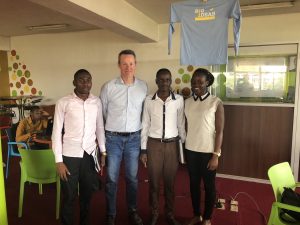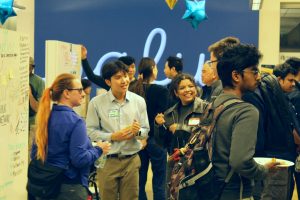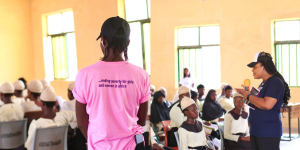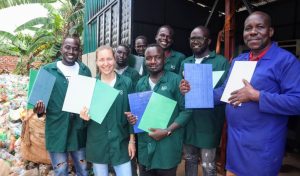In February 2018, Big Ideas Contest Director, Phillip Denny, traveled to Kampala, Uganda to explore opportunities for Big Ideas expansion in Africa, in partnership with Makerere University. Makerere—one of Africa’s leading institutions of higher education—has been a key partner of Big Ideas since 2013. Over the last five years Makerere’s involvement in Big Ideas has grown steadily, as has its reputation as a regional leader in fostering innovation and entrepreneurship among students. Big Ideas is working with Makerere to advance the mission of the competition, which challenges students to dream big about how they might change the world, and supports them to execute that vision.
“Like Big Ideas, Makerere provides a supportive ecosystem that helps students, particularly those who are in the early stages of innovation, realize their dream of making a positive impact on society,” said Denny.

This year, over 50 student teams, representing over 150 students, from Makerere University submitted proposals to Big Ideas, and nine teams advanced to the final round—a record for Makerere. During his trip, Denny mentored teams as they worked to complete their final proposals. He was impressed by the creativity of their innovations, as well as the incredible energy and commitment shown by each team.
“What stands out to me in my work with Makerere students is that many of them are from communities that are directly impacted by the challenges the students are seeking to solve,” said Denny. “When you meet with them you immediately grasp their passion and dedication, which is undoubtedly fueled by their personal and first-hand experiences with the issues they’re trying to solve.”
Deborah Naatujuna, Engagement Manager for the Resilient Africa Network, which hosts the Big Ideas Contest at Makerere, noted the many ways Big Ideas has fostered student collaboration and innovation on campus.
“One of the requirements of the contest is to have a strong team, so students who ordinarily work alone have been able to onboard students from other disciplines. For example, engineering students will work with business students. We did not have this interdisciplinary engagement before, but the contest has improved collaboration between students from different disciplines,” said Naatujna.
The contest has also had a significant impact on students’ relationships with faculty members, breaking down barriers and fostering an innovator-mentor relationship that did not exist before.
“Big Ideas has fostered an innovator-mentor relationship that is not intimidating. Students at Makerere are used to working with academic supervisors in an environment that can often be intimidating for the student, but mentorship through Big Ideas is focused on constructive feedback and collaboration. Participating in the contest has helped students work with their professors in a more collegial way and develop close relationships with their mentors.”
When Big Ideas first launched at Makerere five years ago, the majority of proposals submitted were from male teams. Since then, the involvement of female students from Makerere has also grown.“In the beginning, we had very few females taking part in Big Ideas, but now we have more. Some of the teams are led by women while other teams are completely female. When female students worked with their male counterparts [before], the male students would do the majority of the work. Now we are seeing all-female teams as well as mixed teams in which everyone takes part,” said Naatujuna.
Innovations that were developed on Makerere’s campus include Mama-OPE, a cell-phone based lung monitoring device that helps diagnose pneumonia, and PedalTap, which won 3rd place in the highly competitive Global Health category. Mama-Ope was recently featured on CNN/Africa, and in 2017, PedalTap won Johnson & Johnson’s first Africa Innovation Challenge.
To learn more about the Big Ideas Contest, visit http://bigideascontest.org




